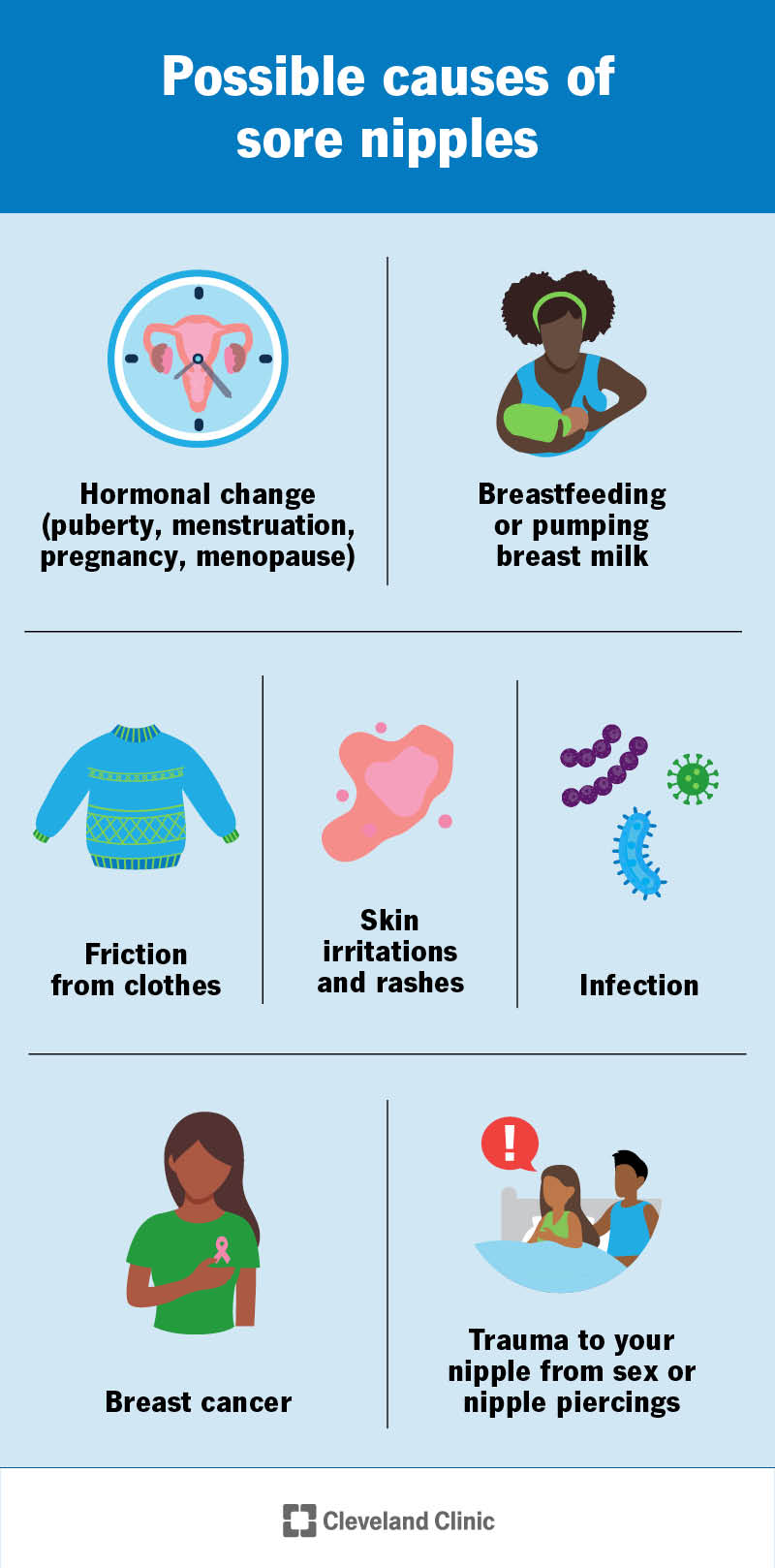There are many possible causes of sore nipples — from menstruation, pregnancy and nursing to skin irritants and infections. Treatment might be as simple as using a different soap or applying ointment. But certain causes, like mastitis, abscesses and breast cancer, need medical attention. When in doubt, seek medical care.
Advertisement
Cleveland Clinic is a non-profit academic medical center. Advertising on our site helps support our mission. We do not endorse non-Cleveland Clinic products or services. Policy

Image content: This image is available to view online.
View image online (https://my.clevelandclinic.org/-/scassets/images/org/health/articles/23164-sore-nipples)
There are many reasons why your nipples might hurt. Most often, it’s due to hormone changes or something irritating your skin. But nipple soreness can also be a sign of a serious disease like breast cancer. See a healthcare provider right away if you have nipple soreness along with other signs, like discharge or breast lumps.
Advertisement
Cleveland Clinic is a non-profit academic medical center. Advertising on our site helps support our mission. We do not endorse non-Cleveland Clinic products or services. Policy
Everyone’s experience is a little different. Some may describe their nipples as:
Possible causes of sore nipples include:
Let’s take a closer look at each of these causes.
Changing levels of certain hormones — like estrogen and progesterone — can trigger a range of symptoms. Here are some times when your hormones might be in flux, causing pain or sensitivity in your nipples and breasts:
Your nipples might hurt, itch and develop a rash in response to certain substances, like:
This type of skin reaction is called contact dermatitis. It means your skin came into contact with something that irritated it or caused an allergic reaction.
Advertisement
It’s also possible to develop eczema on your nipples. This can make your nipples hurt, itch and burn.
Bras or shirts can rub against your nipples and cause soreness and pain. It’s especially common in runners (jogger’s nipple) and athletes. The friction from clothing or poorly fitting bras can cause your nipples to get dry, discolored, chapped or raw.
Breastfeeding or pumping can lead to nipple pain, itching and rashes. This can happen if:
Several different types of infections in your breast area can cause nipple pain, including:
Trauma to your nipple during sex or from nipple piercings can cause pain and irritation. If you have a piercing, check for signs of infection like swelling or pus.
Sore nipples usually aren’t a sign of something serious. But in rare cases, it can point to a type of breast cancer called Paget’s disease of the breast. This condition often causes pain, burning, itching, discharge or changes in how your nipple looks, like flattening or turning inward.
Contact a healthcare provider right away if you have nipple soreness along with any of these symptoms.
Treatment for sore nipples depends on the cause. Your healthcare provider may recommend:
Advertisement
Contact a healthcare provider if:
Your provider may ask you questions like:
All these details can help your provider find the cause so you can find relief.
Pregnancy is just one cause of sore nipples. Hormonal changes at other times, like the week before your period and when you’re in perimenopause, can also cause nipple discomfort. Common reasons for nipple soreness unrelated to hormones include clothes rubbing against your nipple, infections and various forms of dermatitis.
Ovulation can cause sore nipples due to hormonal changes that occur during your menstrual cycle. But it’s more common to experience nipple tenderness in the days just before your period.
Advertisement
When your nipples are sore, you want them to feel better as soon as possible. The first step is figuring out the cause. If you’re not sure why your nipples are sore, it’s always a good idea to check with a healthcare provider. They’ll rule out more serious causes and let you know if you need any treatments. They can also give you tips to keep the discomfort from coming back.
Advertisement

Sign up for our Health Essentials emails for expert guidance on nutrition, fitness, sleep, skin care and more.
Learn more about the Health Library and our editorial process.
Cleveland Clinic’s health articles are based on evidence-backed information and review by medical professionals to ensure accuracy, reliability and up-to-date clinical standards.
Cleveland Clinic’s health articles are based on evidence-backed information and review by medical professionals to ensure accuracy, reliability and up-to-date clinical standards.
From routine pelvic exams to high-risk pregnancies, Cleveland Clinic’s Ob/Gyns are here for you at any point in life.
